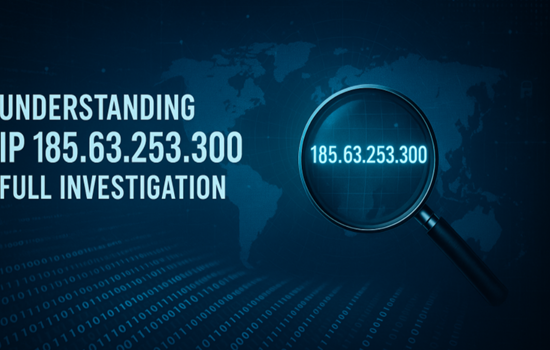185.63.253.300 In the huge and continually changing universe of the internet, IP addresses are distinctive tags of networks and devices that communicate globally. All of the websites you visit, the servers you log into, and the online purchases you make are all accomplished in the background via an IP address. An IP address, 185.63.253.300, has raised the attention of technology-conscious users, security professionals, and net detectives. So what exactly is this IP address, and why would anybody care?
It is here that we get into the nitty-gritty of the IP address 185.63.253.300 space, apply the example case of 185.63.253.300, and explore its potential utility, as well as pitfalls.
Understanding IP Addresses
Let’s learn what an IP address is before diving into the specifics of 185.63.253.300. An IP (Internet Protocol) address is a numerical value assigned to each device that accesses a computer network using the Internet Protocol to communicate. IP addresses have two main uses: identification and location addressing.
IP addresses are classified into two types:
- IPv4 – Four numbers separated by dots, such as 192.168.0.1.
- IPv6 – A more technical format involving hexadecimal and colons, such as 2001:0db8:85a3:0000:0000:8a2e:0370:7334.
Our IP address, 185.63.253.300, looks like IPv4 but is a red herring—it is not a legitimate number. All octets need to be within the range 0 to 255 in IPv4. Because the last octet in our example, 300, exceeds the highest number.
Why 185.63.253.300 Could Possibly Still Be Lurking On-Line
Though the IP address 185.63.253.300 is technically incorrect, it actually shows up on most sites on the Internet, particularly on:
- Spam lists
- Server logs
- Malware reports
- Online search requests
There are a number of reasons for this:
1. Typographical Errors
One of the easiest ones is that there was a mistake made on a correct IP address such as 185.63.253.30 or 185.63.253.100. These mistakes are then spread everywhere across databases and forums, so the incorrect variant shows up more often.
2. Obfuscation in Cybersecurity
Spurious IPs are occasionally employed intentionally in malicious code to hide the true source of an attack or provoke a response from automated systems. Spurious IPs may be employed by cyber crooks in fake traffic logs to deceive investigators.
3. Honeypots and Traps
Network managers and information security experts sometimes employ “honeypots”–decoy systems designed to attract intruders. IP address 185.63.253.300 could be employed in bait-and-switch scenarios, luring malicious actors for study or diversion.
Digging Deeper: What Happens When You Lookup 185.63.253.300
When you try a WHOIS search or find the geolocation of 185.63.253.300, the command will not work or an error message will be provided because it’s in an unhealthy condition. But when you truncate some characters or modify the IP—i.e., modifying it to 185.63.253.30—you’ll find that it resolves to a valid location and provider.
- E.g.
- 185.63.253.30 is hosted on a hosting company.
- It can be owned by a data center, content delivery network, or cloud service.
- This verifies the hypothesis that 185.63.253.300 is a decoy or typo of an active, valid IP.
Security Impacts of Non-Valid IPs
Although 185.63.253.300 is not a valid IP address, its occurrence in spam filters or logs can be a sign of malicious activity. Here’s why:
1. Indicators of Compromise (IOCs)
Suspicious or invalid IPs sometimes appear on IOC lists in relation to threat intelligence. In the event that your network encounters an attempt at communicating with an IP such as 185.63.253.300, it can be employed in a script test or a botnet.
2. Log Tampering
Malicious actors at times manipulate server logs for the purpose of employing spoofed IPs so as to deceive forensic investigators. An invalid IP such as 185.63.253.300 can be employed for that purpose.
3. Firewall Rules and Filters
Other companies mistakenly block non-existent IPs through over-enthusiastic automation. Whilst 185.63.253.300 can’t actually forward traffic, blocking it within a firewall is pointless and could be symptomatic of configuration problems.
Ethical and Educational Use Cases
Whilst invalid, 185.63.253.300 has been employed in certain educational content and internet forums to illustrate:
- How IP validation functions
- How not to create IP filters
- Common cybersecurity errors
- Regex (regular expression) filter demonstrations
In fact, teaching students to catch invalid IPs like 185.63.253.300 is a common beginner’s exercise in programming and network engineering courses.
Conclusion: More Than Just Numbers
At first glance, 185.63.253.300 may seem like a random or meaningless string of digits. But dig a little deeper, and you’ll uncover a wide array of uses, meanings, and implications—ranging from honest typos to deliberate cyber deception.
Invalid IP address is controversial and inflammatory in the virtual world. It makes us wonder at reserve in the world of cybersecurity, technicality of digital forensics, as well as the vast network of machines connected together that constitutes the internet.
Whether you’re a cyber geek, cyber security expert, or simply someone interested in the history of the internet, knowing about anomalies such as 185.63.253.300 places you in the know and on the cutting edge for an ever-changing online universe.

